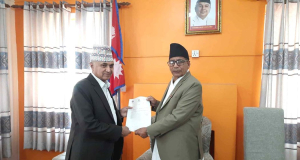Nepal government has introduced ‘Rules Relating to Rights of Persons with Disabilities-2020’, under the Act Relating to Rights of Persons with Disabilities-2017, in order to facilitate differently-abled people with their constitutional and legal rights.
The new rules make it mandatory for the authorities concerned to provide differently-abled people with assistive devices free of cost as per the nature and condition of their disability.
Assistive devices include stylus, slate, braille paper, braille memo, braille displayer, screen reading software, white cane, light indicator, object indicator, wheelchair, crutch, walker, special chair, prosthetic legs and hands, diaper air cushion, special commode, audio induction loop system, infrared system, frequency modulation system, communication access real time translation, automatic speech recognition and magnifying glass.
The rules, published in the Nepal Gazette on August 17, states the government shall make necessary arrangements for distributing assistive devices to the recipient(s) through concerned local levels.
The rules specifies the provision of providing community support service to people with complete disability (‘A’ category) and severe disability (‘B’ category). ‘ A’ category people are included under red colour ID card holder while ‘B’ category persons have been included under blue.
Complete disability means a condition in which one cannot carry out daily activities even with continuous assistance and support of others while people with severe disability are obligated to continuously take other people’s assistance while carrying out individual daily activities.
“The community support services like personal assistant free of cost shall help them for their daily needs. They shall also be entitled to clinical counselling, referral service and peer counselling service” read the rules.
According to the new rules, differently-abled persons will enjoy 50 per cent discount in transport fare on the basis of their ID cards.
The rules also mentions a provision of providing scholarship to the children of differently-abled persons, while making arrangements of special protection for women and children with disabilities.
“Persons with disabilities shall be entitled to free education with residential facility, skill development training, financial package, loan from banks and financial institutions for operating business, reservation in government offices, free health service, rehabilitation and social security allowance,” read the rules.
Earlier, the National Human Rights Commission (NHRC) had urged all three levels of the government to specify their obligations to protect the rights of persons with disabilities clearly in their laws and ensure an environment that would enable them to lead a dignified life.


